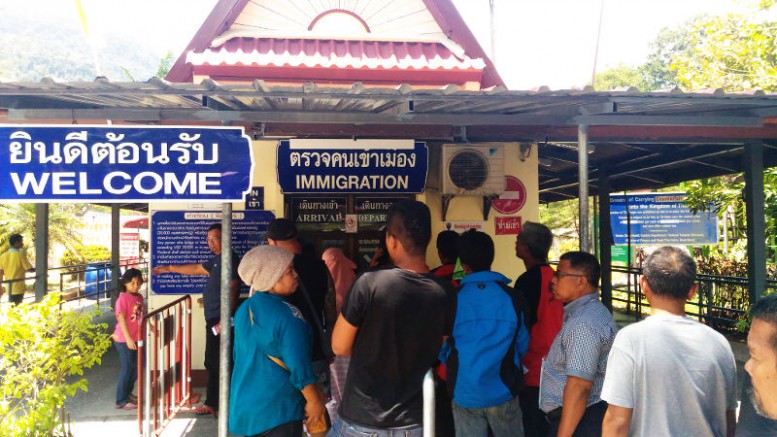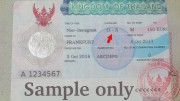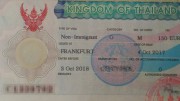Thailand is one of the most popular tourist destinations in the world, attracting millions of visitors every year. Many of these visitors come for a short-term stay, usually on a 30-day visa exemption or a 60-day tourist visa. However, sometimes visitors need or want to extend their stay in Thailand. In this article, we will explore the different types of visa extensions available in Thailand.
30-Day Entry Stamp | Visa Exemption Rule
Most visitors to Thailand are eligible for a 30-day entry stamp or visa exemption upon arrival. This stamp or exemption allows visitors to stay in the country for up to 30 days without the need for a visa. However, if you wish to extend your stay beyond the initial 30 days, you can apply for a one-time extension at the nearest immigration office. The cost of this extension is 1900 Baht, and it allows you to stay in Thailand for an additional 30 days.
Tourist Visa with One Entry
If you plan to stay in Thailand for more than 30 days, you can apply for a tourist visa with one entry. This type of visa allows you to stay in the country for up to 60 days from the date of your arrival. If you wish to extend your stay beyond the initial 60 days, you can apply for a 30-day extension at the nearest immigration office.
Tourist Visa with Multiple Entries
If you plan to leave and re-enter Thailand during your stay, you can apply for a tourist visa with multiple entries. This type of visa allows you to stay in the country for up to 60 days per entry. If you wish to extend your stay beyond the initial 60 days, you can apply for a 30-day extension at the nearest immigration office.
Non-Immigrant O-A Visa
If you plan to stay in Thailand for an extended period, you can apply for a non-immigrant O-A visa. This type of visa is for retirees who are over 50 years old and wish to stay in Thailand for a year or more. This visa can be obtained at a Thai embassy or consulate outside of Thailand. Once you enter Thailand with this visa, you can extend your stay for an additional year by doing a new entry or applying for an extension after one year.
In conclusion, if you plan to stay in Thailand for a longer period, there are several options available for visa extensions. These include a one-time extension for the 30-day entry stamp or visa exemption, a tourist visa with one entry or multiple entries, and a non-immigrant O-A visa for retirees over 50. It is important to note that visa rules and requirements are subject to change, and it is always best to check with the Thai embassy or consulate in your home country for the most up-to-date information.
Requirements for extending a Non Immigrant Visa in Thailand
If you wish to extend a Non-Immigrant Visa for another year while inside Thailand however, you must meet certain requirements. These requirements may vary depending on the specific type of non-immigrant visa you hold, but some of the common requirements include:
Financial requirements: You must have at least 800,000 Baht (400,000 if legally married to a Thai) in a Thai bank account for at least two months prior to the visa extension application, or a monthly income of at least 65,000 Baht, or a combination of both. If you are unable to meet these financial requirements, you may be able to show proof of a pension or investments to meet the financial requirements.
Health insurance: You must have health insurance that provides coverage in Thailand and meets the requirements set by the Thai government. This requirement is mandatory for all non-immigrant visa holders who are 50 years or older.
Health certificate: You must obtain a health certificate from a Thai hospital or clinic, stating that you do not have any contagious diseases or other medical conditions that could pose a public health risk.
Rental contract: You must provide a rental contract or proof of ownership of a property in Thailand to show that you have a place to live during your stay.
It is important to note that the requirements for a visa extension can change, and it is always best to check with the Thai immigration office for the most up-to-date information. Additionally, the application process for a visa extension can be complex and time-consuming, and it is recommended to seek the assistance of a qualified immigration lawyer or consultant to ensure that all requirements are met and the application is successful.
Visa Extension by Exit & Re-Entry (Visa-Run)
Only for Visas with multiple Entry; Tourist or Non Immigrant…
If you want to extend your stay in Thailand by doing a new entry, you will need to leave the country and re-enter before your current visa expires. This process is commonly referred to as a “visa run” or “border run.”
To do a visa run, you will need to leave Thailand and go to a neighboring country or another country outside of Thailand. The duration of your stay outside of Thailand will depend on the type of visa you plan to apply for when re-entering Thailand. For example, if you plan to apply for a new tourist visa with a single entry, you will need to stay outside of Thailand for at least one day before re-entering. If you plan to apply for a non-immigrant visa, you may need to stay outside of Thailand for a longer period.
It is important to note that visa runs are subject to change, and some countries may have restrictions on entry due to COVID-19 or other reasons. Additionally, visa runs can be expensive, and the cost of transportation, lodging, and visa fees can add up quickly.
Therefore, before deciding to do a visa run, it is recommended to research the visa requirements and costs for the country you plan to visit, as well as any travel restrictions or requirements due to COVID-19. You may also want to consider consulting with a qualified immigration lawyer or consultant to explore other options for extending your stay in Thailand, such as a visa extension or changing your visa status.




